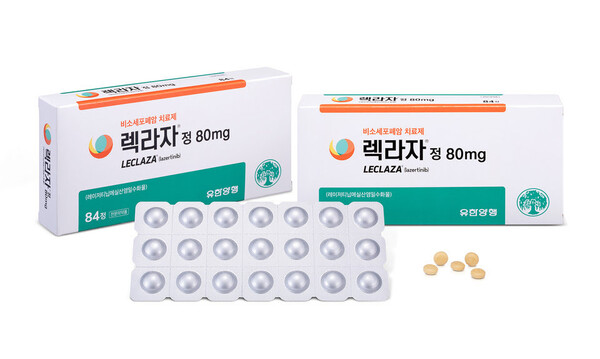Korea’s Yuhan Corp. is tightening its grip on U.S. rights to its homegrown EGFR inhibitor lazertinib, branded locally as Leclaza and overseas as Lazcluze, by securing a new formulation patent aimed at keeping generics at bay even after core exclusivity runs out.
On June 3, the U.S. Patent and Trademark Office granted Patent No. 12,318,390 B2, covering an oral formulation of lazertinib for EGFR-mutant non-small cell lung cancer, designed to stabilize stomach absorption and reduce swings in drug levels tied to food intake or acidity.

The formulation combines microcrystalline cellulose and mannitol as diluents for immediate release, an approach aimed at curbing the inconsistent bioavailability that often undermines oral kinase inhibitors.
“The inventors found that combining lazertinib with these specific excipients makes it possible to prepare an immediate-release formulation that’s less sensitive to pH variation,” the patent states, citing “significantly increased bioavailability” as a key result.
While a compound patent protects the molecule, a formulation patent guards the delivery. For Yuhan, it adds a second layer of defense against generics aiming to copy Lazcluze's active ingredient.
The patent also lists supporting agents like croscarmellose sodium, a disintegrant, and magnesium stearate, a lubricant, with precise ratios fine-tuned for stability and absorption. One version uses lazertinib mesylate in crystalline form, identified by PXRD, which maps crystal structure, and DSC, which tracks heat response, to confirm its uniqueness.
The U.S. grant adds to a growing global IP wall. Yuhan first filed the formulation in Korea in 2018, followed by a 2019 international application under the Patent Cooperation Treaty.
Since then, the company has sought protection in more than 30 countries, including the U.S., Europe, China, Japan, and Brazil, according to patent records. Approvals have already been granted in markets such as Japan, India, and most recently, Israel.
In August 2024, Lazcluze secured its first U.S. approval when the FDA cleared it in combination with Johnson & Johnson’s bispecific antibody Rybrevant (amivantamab) for EGFR-mutant NSCLC.
That nod marked a milestone as the first U.S. approval for a domestically developed Korean oncology drug. The Lazcluze-Rybrevant combo has since been approved in the U.S., Canada, Europe, and Japan.
Related articles
- Yuhan collects $15 mil. as J&J lung cancer combo hits Japan
- J&J launches Yuhan-partnered lung cancer combo in Japan as AstraZeneca secures Tagrisso expansion
- Lazertinib shows 50% ORR in NSCLC patients with atypical EGFR mutation: study
- J&J highlights Rybrevant-Leclaza combo’s survival benefit in EGFR-mutant lung cancer
- EU approves J&J’s injectable Rybrevant with Yuhan’s Leclaza for lung cancer
- J&J: Yuhan-partnered lung cancer combo may beat AZ’s osimertinib in survival by a year
- Yuhan's 2024 revenue surpasses ₩2 trillion thanks to lung cancer drug
- Yuhan to receive $60 million milestone from Janssen for NSCLC drug lazertinib
- Yuhan's Leclaza becomes 1st Korean-made anti-cancer drug to score FDA nod
- Yuhan’s allergy biologic shows symptom control in Xolair-resistant chronic hives
- J&J and Yuhan push challenger to AZ’s Tagrisso in Korea with next-phase Rybrevant combo
- Yuhan expands obesity pipeline with next-gen drugs, reformulated therapies
- Leclaza vs. Tagrisso: similar efficacy, different risks in EGFR-mutant lung cancer
- Yuhan, Shinhung team up to launch joint venture for dental implants
- J&J’s Rybrevant-Lazcluze combo with Yuhan wins China approval, setting off $45 mil. milestone
- Family of lung cancer patient pleads for coverage of new drug Rybrevant

